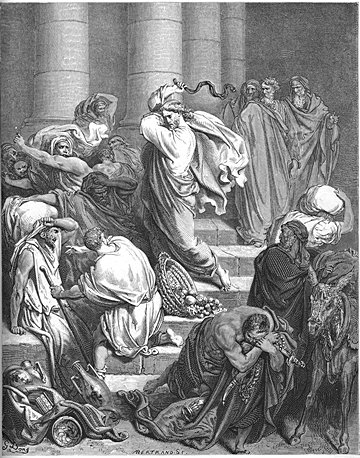Jaona 2
1 Ie tongoa’ ty herone le tondroke e Kana e Galilia añe ty enga-valy naho teo ty rene’ Iesoà
And [on] the third day a wedding happened in Cana of Galilee, and the mother of Jesus was there,
2 vaho songa nañambaràñe homb’ amy enga-vaoy t’Iesoà naho o mpiama’eo.
and also Jesus was called, and His disciples, to the wedding;
3 Ie ho nikapioke ty divay le hoe i rene’ Iesoà ama’e: Tsy aman-divay iereo.
and wine having failed, the mother of Jesus says to Him, “They have no wine”;
4 Tinoi’ Iesoà ty hoe: O Rakembao, inoñ’ ama’o naho amako izay? Mbe tsy tsatoke ty orako.
Jesus says to her, “What [is that] to Me and to you, woman? My hour is not yet come.”
5 Fe hoe ty nafanton-drene’e amo mpitoroñeo: Anò ze ampanoa’e.
His mother says to the servants, “Whatever He may say to you—do.”
6 Nidoñe marine eo ty sajoa vato eneñe, fañaliova’ o Jiosio, songa nahaatseke fañaranañe telo ndra roe.
And there were six water-jugs of stone there, placed according to the purifying of the Jews, holding each two or three measures.
7 Hoe t’Iesoà tam’ iareo: Atsafo rano o sajoao. Le nipeà’ iereo pak’an-tsoñi’e.
Jesus says to them, “Fill the water-jugs with water”; and they filled them—to the brim;
8 Le hoe re tam’ iereo: Anovizo henaneo vaho endeso amy talèn-engay. Le nandesa’ iareo;
and He says to them, “Draw out, now, and carry to the headwaiter”; and they bore.
9 aa naho nitsopeke i rano niova ho divaiy i talèn-tsabadidakey, ie tsy napota’e ty nihirifa’e, fa o mpitoroñe nanovy i ranoio avao ro nahafohiñe, le kinanji’ i talen-tsabadidakey i mpañengay
And as the headwaiter tasted the water become wine, and did not know where it is from (but the servants knew, who have drawn the water), the headwaiter calls the bridegroom,
10 vaho nanoa’e ty hoe, Fanjotso’ ondatio aolo ty divay soa, ie nikamaeñe, vaho izay ty masay; fa ihe ka nañaja ty divay soa ampara henane.
and says to him, “Every man, at first, sets forth the good wine; and when they may have drunk freely, then the inferior; you kept the good wine until now.”
11 Izay ty lengom-bilo’ Iesoà nanoe’e e Kana’ i Galilia añe, nampiboake ty enge’e naho nampiantofa’e o mpiama’eo.
This [is the] beginning of the signs Jesus did in Cana of Galilee, and revealed His glory, and His disciples believed in Him;
12 Ie modo izay le nizotso mb’e Kapernaome mb’eo, ie naho i rene’e naho o rahalahi’eo vaho o mpiama’eo, le nitoetse ao andro tsy ampeampe.
after this He went down to Capernaum, He, and His mother, and His brothers, and His disciples; and they did not remain there many days.
13 Ie an-titotse i Fihelañ’ ambone’ o Jiosioy, le nionjomb’e Ierosaleme añe t’Iesoà.
And the Passover of the Jews was near, and Jesus went up to Jerusalem,
14 Naho nizoe’e an-kiririsan’ anjomban’ Añahare ao o nandetak’ añombe naho añondry naho dehoo, vaho o mpampikalo dralao mitoboke ey.
and He found in the temple those selling oxen, and sheep, and doves, and the money-changers sitting,
15 Aa le namboare’e firison-kafotse naho fonga sinoi’e hiakatse i anjombay mindre amo añondrio naho o añombeo, le nalonga’e o dralam-pampikalo dralao vaho navalihoho’e o talatalao,
and having made a whip of small cords, He put all forth out of the temple, also the sheep, and the oxen; and He poured out the coins of the money-changers, and He overthrew the tables,
16 le hoe re amo mpandetake dehoo: Akaro añe o rahao vaho ko anoeñe kibohon-kilankañe ty anjomban-dRaeko.
and He said to those selling the doves, “Take these things from here; do not make the house of My Father a house of merchandise.”
17 Le nitiahi’ o mpiama’eo i pinatetse, ty hoe: Nampibotsek’ ahy ty fahimbañako amy anjomba’oy.
And His disciples remembered that it is written: “The zeal of Your house ate Me up”;
18 Tinoi’ o Tehodao ty hoe: Inoñe ty viloñe hatoro’o anay, te ihe manao o raha retiañe?
the Jews then answered and said to Him, “What sign do You show to us—that You do these things?”
19 Natoi’ Iesoà ty hoe: Rotsaho ty anjomba toy le hatroako añate’ ty telo andro.
Jesus answered and said to them, “Destroy this temple, and in three days I will raise it up.”
20 Aa le hoe o Tehodao: Efapolo eneñ’ amby taoñe ty namboareñe ty anjomba toy, vaho hatroa’o añ’ ate ty telo andro?
The Jews, therefore, said, “This temple was built [in] forty-six years, and will You raise it up in three days?”
21 Fa i akibam-pañova’ey ty nienta’ey.
But He spoke concerning the temple of His body;
22 Aa ie nivañom-belon-dre le nitiahi’ o mpiama’eo i tsinara’e am’iereoy; le natokisa’ iareo o Sokitse Masiñeo naho ty entañe nisaontsie’ Iesoà.
when, then, He was raised out of the dead, His disciples remembered that He said this to them, and they believed the Writing, and the word that Jesus said.
23 Ie te Ierosaleme ao amy Fihelañey, le maro ty niantoke i tahina’ey te nahaisake o raha tsitantane nanoe’eo.
And as He was in Jerusalem, in the Passover, in the celebration, many believed in His Name, beholding His signs that He was doing;
24 F’ie tsy nampivave’ Iesoà, amy te kila arofoana’e ondatio;
and Jesus Himself was not trusting Himself to them, because of His knowing all [men],
25 vaho tsy nipay mpitalily ondaty, fa arofoana’e ze am’ondatio.
and because He had no need that any should testify concerning man, for He Himself was knowing what was in man.





















